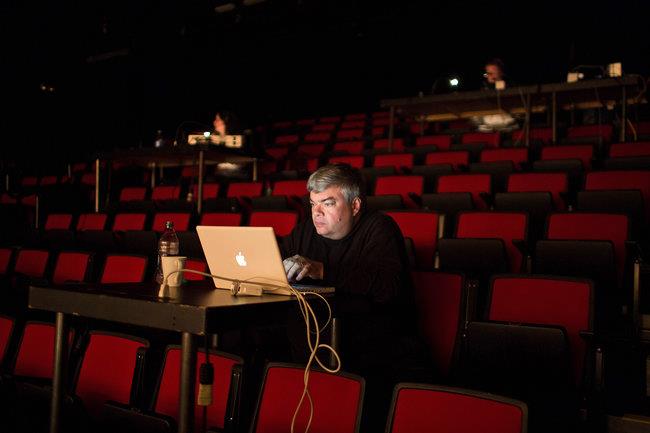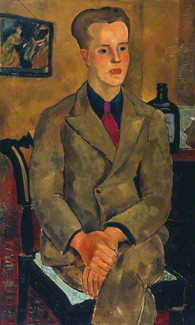Now that I’ve finished Duke: A Life of Duke Ellington, I find myself thoroughly disconcerted to have written two jazz biographies in a row.
I was typecast as a specialist in music throughout the first part of my career as a writer, and I worked very hard for a very long time to extract myself from that pigeonhole. Least of all did I ever want to be seen as someone who wrote exclusively or primarily about jazz, not because I didn’t love it passionately but because the audience for jazz isn’t all that large. In any case, my cultural interests have always extended far beyond the compass of jazz in particular and music in general, and I was determined to get myself into a position where editors thought of me first and foremost as a generalist, a “utility outfielder” who knew as much about Chekhov and Vuillard as Fauré or Bix Beiderbecke.
 In time that started to happen, and now it’s come to pass. Not only am I The Wall Street Journal‘s drama critic, but I also write a biweekly cultural column for the Journal in which I range as far afield as I like, and my title at Commentary was changed four years ago from “music critic” to “critic-at-large.” Between 2002 and 2009 I published biographies of H.L. Mencken, George Balanchine, and Louis Armstrong, and I also published a self-anthology of essays that covers every branch of artistic endeavor save for the visual arts, in which I have since immersed myself.
In time that started to happen, and now it’s come to pass. Not only am I The Wall Street Journal‘s drama critic, but I also write a biweekly cultural column for the Journal in which I range as far afield as I like, and my title at Commentary was changed four years ago from “music critic” to “critic-at-large.” Between 2002 and 2009 I published biographies of H.L. Mencken, George Balanchine, and Louis Armstrong, and I also published a self-anthology of essays that covers every branch of artistic endeavor save for the visual arts, in which I have since immersed myself.
Hence it feels strange to have returned to the same well for the second time in a row, and to have written about a pair of closely contemporary jazz musicians. The fact is that my decision to write two jazz biographies signifies nothing more than that I thought it would be both interesting and fun (which it was) to write about Duke Ellington. My cultural horizons are still wide, and they show no signs of shrinking in middle age. If anything, I spend less time thinking about music now than I did, say, five years ago.
All that said, I’ve enjoyed spending an extended period of time (for me, anyway) pretending to be a specialist. I have no trouble understanding the appeal of being a scholar who spends his whole life digging the same hole deeper and deeper, and who knows pretty much everything there is to know about one person. I could easily have gone in that direction, and I think it would have made for a satisfying life.
 But I didn’t. For some reason that I don’t fully understand, I decided around the time that I graduated from college that I didn’t want to specialize in anything, thus ensuring that I wouldn’t become an academic, much less a professional musician. Instead I write about all of the arts, and of late I’ve branched out to become a playwright and opera librettist as well. It’s always been my goal to emulate the composer-critic-conductor Constant Lambert, who figures prominently in the pages of Duke and whom Anthony Powell described as having “an unrivalled capacity, amounting to genius, for seizing on the essential point in any of the arts.” I’m the furthest thing from a genius–I’ve known enough geniuses to know that–but I’m proud to have been able to transcend mere dilletantism and function as a true professional in more than one field.
But I didn’t. For some reason that I don’t fully understand, I decided around the time that I graduated from college that I didn’t want to specialize in anything, thus ensuring that I wouldn’t become an academic, much less a professional musician. Instead I write about all of the arts, and of late I’ve branched out to become a playwright and opera librettist as well. It’s always been my goal to emulate the composer-critic-conductor Constant Lambert, who figures prominently in the pages of Duke and whom Anthony Powell described as having “an unrivalled capacity, amounting to genius, for seizing on the essential point in any of the arts.” I’m the furthest thing from a genius–I’ve known enough geniuses to know that–but I’m proud to have been able to transcend mere dilletantism and function as a true professional in more than one field.
To be sure, I am now officially in a position to call myself the biographer of the two greatest jazz musicians of the twentieth century. I can absolutely guarantee you, however, that I won’t be shooting for three. If I write another biography, which I’d like to do, it will almost certainly be about somebody who isn’t a jazz musician, a choreographer, a journalist–or a man.
Who might she be? Beats me. But if and when when the right woman comes along, I’ll know. And if not, I’ll write another play instead. Or an opera. Or something completely different.
* * *
Constant Lambert’s The Rio Grande, a 1927 setting of a poem by Sacheverell Sitwell, performed by Jack Gibbons, Sally Burgess, the Opera North Chorus, and the English Northern Philharmonia, conducted by David Lloyd-Jones:
Terry Teachout on the arts in New York City
An ArtsJournal Blog
